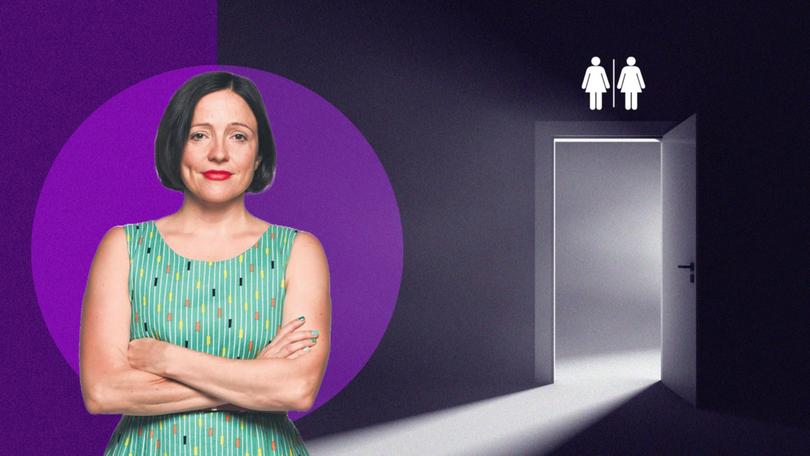KATE EMERY: Why Giggle v Tickle is no laughing matter (and nothing to worry about)
KATE EMERY: Anyone who thinks the biggest threat to women’s rights is trans women using social media apps or having a wee in the ladies' toilet is either stupid or lying.

Maybe I’ll start worrying about trans women in “women only” spaces when someone can convincingly demonstrate what meaningful difference it makes to me.
Give me one good reason to care whether a trans woman is using the stall next to me in a public bathroom, changing beside me in a public change room or accompanying me on the women-only cycling-and-wine through Italy tour I occasionally fantasise about taking.
Because, unless they’re committing the social faux pas of trying to make conversation while I’m half-naked or mid-wee, I can’t see why I should give much of a stuff whether the woman next to me has identified as such since birth or since last year.
Sign up to The Nightly's newsletters.
Get the first look at the digital newspaper, curated daily stories and breaking headlines delivered to your inbox.
By continuing you agree to our Terms and Privacy Policy.On Friday the Federal Court of Australia found trans woman Roxanne Tickle was discriminated against on the basis of her gender identity when she was kicked off a women-only app, Giggle for Girls, and there’s been a lot of nonsense written about what it all means.
What it should mean is that the anti-trans lobby finds a new hobby and gives up harassing a tiny minority of already-vulnerable people who, as Federal Court Justice Robert Bromwich has just confirmed, are protected by law from some stranger’s weird obsession with their genitals, chromosomes or whatever it is we’re all supposed to be so scared of.
Unfortunately, I don’t think we’re that lucky.

This palaver started in 2021 when Ms Tickle joined the (now shelved) social media app Giggle, submitting a selfie as part of her registration.
That selfie was approved by an AI bot but months later seen and rejected by a human employee, who kicked Ms Tickle off the app.
One lawsuit later, Justice Bromwich found Ms Tickle was indirectly discriminated against on the basis of her gender identity because the app required she “have the appearance of a cisgender woman”.
Justice Bromwich also took time to spell out in his judgment that sex is more than a biological concept but can include physical characteristics, legal recognition and how someone identifies and presents socially.
No kidding.
My knowledge of the law is mostly confined to having watched all five seasons of Ally McBeal (the pre-streaming years were dark days and don’t let anyone tell you different) but I could have told the Giggle team that.
The Giggle v Tickle outcome has been reported around the world at a time when the right of trans people to exist is under attack from both far-right politicians and (weirdly) children’s author JK Rowling.
Cue the fear-mongering about the implications for women-only spaces if trans women are allowed into them.
Considering that Justice Bromwich’s judgment cited 30 years of legal precedent, some of this handwringing feels misplaced.
Trans women are legally allowed in women-only spaces! Just like they have been for years!
And…?
This might come as a shock to someone who knows as much about trans people as, well, the average Giggle employee, but trans women are already in women’s spaces.
They’ve been there for years.
Long before you or I knew what “cisgender” meant, before social media apps were a thing or Ally McBeal traumatised a generation with that CGI dancing baby (if you know, you know).
When I try to work out why I’m suddenly expected to worry about trans women in, say, women’s bathrooms, the best I can come up with is that it probably means the lines are slightly longer than they might otherwise be. But you know what? We’re coping. I can hold it.
I’m similarly baffled by the “issue” of trans women using women’s changing rooms — another topic inclined to get some people’s bathing suits in a twist.
My young daughters and I get changed in public change rooms after swimming lessons most weeks.
Statistically, I assume there’ve been transwomen in there too at some point but I couldn’t tell you for sure: I’m too busy trying to peel my five year old’s bathing suit from her flailing limbs to perform a casual genital inspection on the women around me or demand a DNA swab from a stranger.
There are plenty of things I’m afraid of in these kind of public spaces: cockroaches, catching athlete’s foot in the shower, running into someone I know when my bathers are half off. Trans women, who are by the way far more likely to be the victim of violence than its perpetrator, don’t make the list.
Women’s rights matter and are worth protecting. But anyone who thinks the biggest threat to women’s rights is trans women using social media apps or having a wee in the ladies’ toilet is either stupid or lying.
In Afghanistan, women are now required to cover their faces at all times and are forbidden from speaking in public.
In the US, women’s reproductive rights are being rolled back, with more than a dozen states all but banning abortion since the Supreme Court overturned Roe v Wade.
In Australia, a new report has described family violence as a “national emergency”.
If women’s rights are what keep you up at night, try giving a stuff about one of these genuine threats.
If the truth is that you just don’t think trans women should exist, well, that’s on you. And you sound ridiculous.
